“This summer, I made it a priority to balance professional learning with fun”

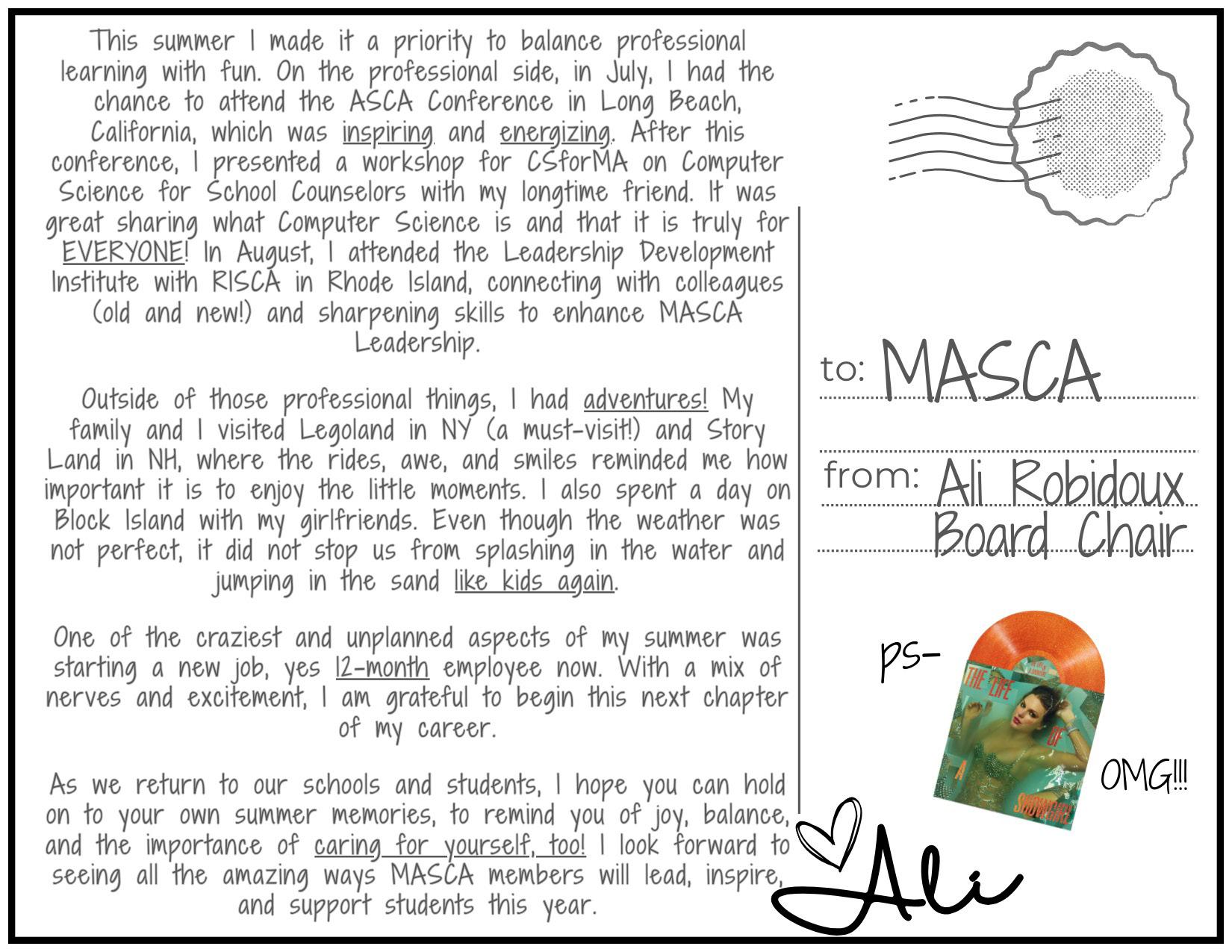

“This summer, I made it a priority to balance professional learning with fun”


By Bob Bardwell, MASCA Executive Director

Bob Bardwell
As the calendar turns to September, it’s time to gear up for the 2025-26 school year. By the time you read this most of you have already returned to work, even if without students yet. Either way I am hopeful that you had a relaxing, safe and fun-filled break, whether that be two weeks or two months.
Let’s start with an acknowledgement. For anyone who is not new to education, you have probably heard something like – “This is going to be the most challenging year ever,” or something along those lines. That is likely to have been true. However, when I say that “2025-26 is going to be the most challenging year ever,” I really mean it and here’s why:
• Many of our students and families are dealing with unprecedented personal challenges meaning that school is no longer a top priority;
• Funding has been and continues to be atrisk, especially for districts who rely heavily on federal government funding; and
• External threats from community groups, parent organizations and political entities
are now more common than ever before and creating additional burdens for you and your school community.
I feel that if I did not acknowledge this alarming reality, that the rest of what I am going to share would be irrelevant. It is my hope that you can put this “noise” aside as best you can, find your peeps (either internally or externally) who will lift you up and support you and focus on the students sitting in front of you who desperately need your help now more than ever to navigate what’s ahead for them.
Now onto the good stuff.
I first want to thank the Governing Board for taking a leap of faith and appointing me as MASCA’s first full-time Executive Director. When I was appointed the part-time Executive Director in June 2019, I had no idea what was ahead and never dreamed I would have this much fun and be able to promote school counseling in the Commonwealth. I look forward to continue to work with all of you doing the great work we are doing and provide our students and families with the necessary tool and resources to successfully navigate through their PreK-12 and beyond years.
While we have much to do to make things better, we are moving in the right direction. Thank you for being a part of this exciting journey.
While you were away on summer break, MASCA has been hard at work continuing our programming and planning for the coming year. July started out the annual American School Counselor Association’s (ASCA) annual conference and Elevate (formerly called Leadership Development Institute) in Long Beach, CA. Ali Robidoux (Board Chair), Cory McGann (Board Assistant Chair), Mindy Cripps (Ethics Committee Chair) and Colin Moge (2024 School Counselor of the Year) accompanied me to Long Beach. We were treated to beautiful weather, great programs and the opportunity to network with thousands of school counseling colleagues across the globe.
Back home for only a few days, MASCA pulled off our largest and most successful School Counselor Sum(continued next page)
(continued from previous page)
mer Camp (SC2) at the College of the Holy Cross in Worcester. Our third annual effort brough out 67 counselors and colleagues from across the state and from New York, Vermont and even South Carolina. While we will not soon forget the hill climb on campus, we were treated to lots of exciting, educational and inspiring sessions sprinkled in with some traditional summer camp games and songs. Thank you to Amanda Ugrinow and the entire faculty (Mindy Cripps, Andrea Encarnacao Martin, Cynthia Esielionis, Shanelle Fernandez, Diana Fullerton, Deb Hempel, Katie Kochan, Tama Lang) for ensuring another successful program. You can view highlights and see pictures on our Summer Camp website. Most exciting was the fact that of the 67 participants, 13 (19%) have attended all three years! We will announce the 2026 location soon but mark your calendars for July 21-23 for SC2 #4.
Our final big summer program was our annual Leadership Development Institute (LDI). This has been a staple event when we invite all of the Governing Board – voting members, committee chairs, appointed positions, liaisons, Emerging Leaders and our Special Interest (SIG) and Affinity Group (AG) leaders – to come together for a two-day retreat. The cool part for 2025 is that we invited our Rhode Island School Counselor Association (RISCA) colleagues to join us. Fourteen of their board members joined with our 37 to make an absolutely wonderful and invigorating experience, one that will most likely be continued moving forward. We were able to explore a bit of Newport and Providence and learned a great deal about leading and growing our associations in these challenging times.
As we start the new school year, there are many exciting and new opportunities for you including:
• A Legal and Ethical Microcredential part 2 starting on October;
• A new microcredential focused on race and gender starting on November;
• Our annual election day PD – Special Education, held at Assumption University on November 4 from 8:00-3:00. PDPs and CEs available. Register here.
• A new and fresh look to our premier newsletter publication – the Counselor’s Notebook. We thought it was time to update the look and feel and hope you like it. Many thanks to our Editorial Board team (Jean Atwater-Williams, Nguyen Dorvilus & Guiying Zhu) for spearheading these efforts.
• Our annual spring conference will return March 15-17, 2026, again at the Sheraton Framingham. This year it is a bit earlier than in recent years to avoid any MCAS testing which has been a barrier for some in the past. We are currently soliciting conference breakout sessions which are due September 30. Feel free to submit your best practices and share what great things you are doing in your schools.
• Our 11 SIGs and AGs are already planning many great programs and opportunities for the coming year. Check our weekly Wednesday MASCA Matters newsletter or the specific emails that you receive with those announcements.
• And finally, new this year, we will be offering CEs to our members who need to earn CEs to renew their external licenses (i.e.: LISW, LMHC, etc.). CEs do not apply to those who only hold DESE professional licenses. You will still continue to need 150 PDPs to recertify every five years.
I hope that the 2025-26 school year is amazing and enjoyable in so many ways. I know that our work will continue to be difficult, exhausting and complex, but you know just how important what we do is for the thousands of students and families in the Commonwealth. You are super heroes!

Lindsay Almeida
Howard Bean
Brooke Beaudette
Shannon Borgesen
Kasey Caito
Brittany Cann
Anne-Marie Chace
Lisa Chasse
Carol Cohen
Alison Coubrough-Argentieri
Camille Desjardins
Janaina DeSouza
Maria Francisco
Tatyana Frederick
Lauren Galligan
Meredith Gaynor
Kurtis Graeff
Andrea Holmes
Tim Holtsnider
Amy Huston
Emily Johnson
Janice Johnson-Plumer
Laurance Kimbrough
Frederick Laire
Rachel Levesque
Ryan Lucy
Meghan MacKay
Kathleen Mackenzie
Kim MacLean
Michelle Mahoney
Erin Martineau
Lucas Matthews
Katelyn Miller
Dzung Nguyen
Erin Nourse
Maddie Obuchowski
Ina Perez
Francisca Pires
Alicia Porter
June Reedy
Kayla Rodrigues
PJ Rufo
Joselyn Salgado
Eric Schlesinger
Nicole Shadeed
Abigail Stanton
Sean Stevenson
Brittany Welch
Lily Wildrick
Marcus Williams
Michael Zhang
Emma Zink
If you know or happen to meet any of our new members, please extend a very warm welcome!
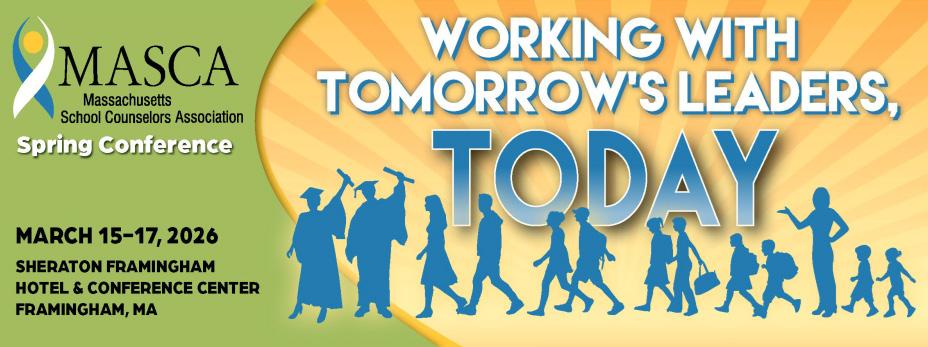
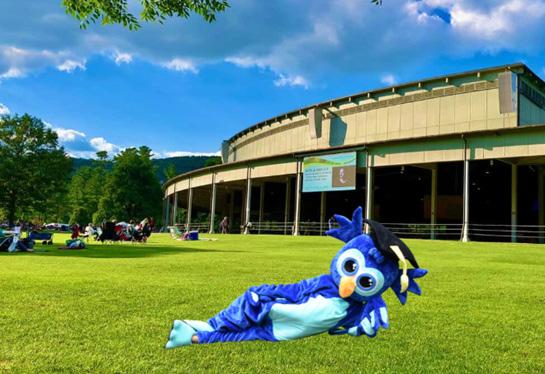
Do you know Ollie? Ollie is MASCA’s very own mascot, who joined the MASCA family in the spring of 2025. MASCA was the first state school counselor association to adopt an official mascot. The Member Engagement Committee agreed that a MASCA mascot could bring positive energy to the association, while creating a recognizable, engaging symbol members can rally around. Ollie’s purpose is to foster a sense of belonging and pride, helping us to feel connected to MASCA and each other in a fun way.
The MASCA Member Engagement Committee is pleased to share a new monthly challenge. Each month Ollie will be visiting a
location in Massachusetts. Your mission is to identify the location, and you just might win a fabulous prize! Can you guess where Ollie is? This month’s prize is a free MASCA membership, or you may choose to gift the membership to a fellow school counselor.
Send us your guess using this form or scanning the QR code below by 9/15/25. One entry per person.

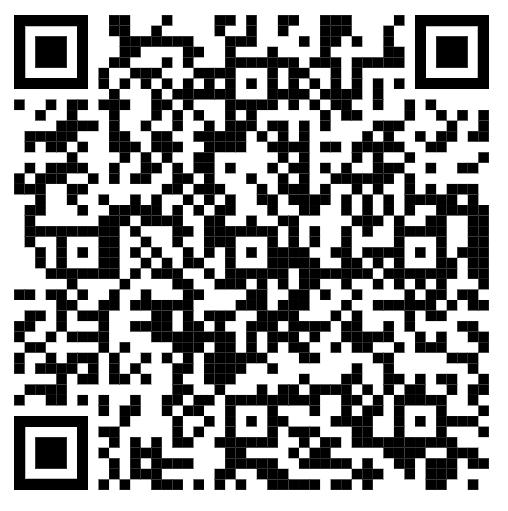
Childhood
By Denise Evans, MASCA Diversity Fellow
Schools often ask the question, “How can we help our autistic students adjust to school?” The real question should be, “How do we adjust the school to them?” As a school counselor and a parent of two autistic children, I’ve learned that inclusion doesn’t mean fitting these students into our version of what we think they should be able to do, rather adjusting the systems in place to meet them where they are while embracing their differences. Supporting autistic students is more than offering academic accommodations, facilitating 504 meetings, or reading their IEPs. It requires a commitment to understanding their unique experiences and getting to know them personally just like any other student. This article offers school counselors practical ways to advocate, collaborate, and create school environments where autistic students can thrive and feel connected to the school community.
According to the National Institute of Mental Health, autism is a “neurological and developmental disorder that affects how people interact with others, communicate, learn, and behave.” While this definition can be broad, the reality is actually so much more complex. No two autistic students are alike, and each brings their own set of strengths, challenges, and needs. These can include sensory processing differences, communication and language barriers, issues with executive functioning, emotional dysregulation, behavioral and social difficulties, a strong need for predictability and routine, and/or limited body or safety awareness. Some students may struggle with understanding social cues and body language, while others may blend into a social group. One student may get overstimulated with loud noises in an unstructured environment, and another may welcome the chaos and sensory input. Some students may be nonverbal and unable to communicate through

speech, while others can be very articulate in expressing language. Certain students may elope (run away) from staff or caregivers, or engage in physical aggression as a way to communicate and regulate themselves. Acknowledging that autism looks different from person to person reminds us that our support should be individualized for every student’s unique needs.
There is an outdated idea that autism is a linear spectrum, with language such as “low functioning” versus “high functioning” or “mild” versus “severe”. This notion fails to account for the many complexities and can reinforce some negative and untrue stereotypes. This mindset needs to shift to thinking about autism as a wheel, where communication, sensory needs, social interaction, emotional regulation, and cognitive abilities vary from person to person. (See chart below) Not every autistic student will present the same. The symbolism used to represent autism has also evolved over time. A puzzle piece was once commonly associated with autism, but many autistic individuals have expressed that the puzzle piece signifies that something is missing or incomplete. Instead, an infinity sign is embraced by many within the community to represent the infinite potential and diversity of being autistic. Having this diagnosis is not a deficit, or something to be fixed, but rather is a difference in the way they experience the world. Autistic students do not need to conform to our expectations, and school counselors can help bridge that gap to recognizing their strengths, supporting their challenges, and helping them build the skills and confidence to succeed in a world that is still learning how to include them.
(continued next page)
(continued
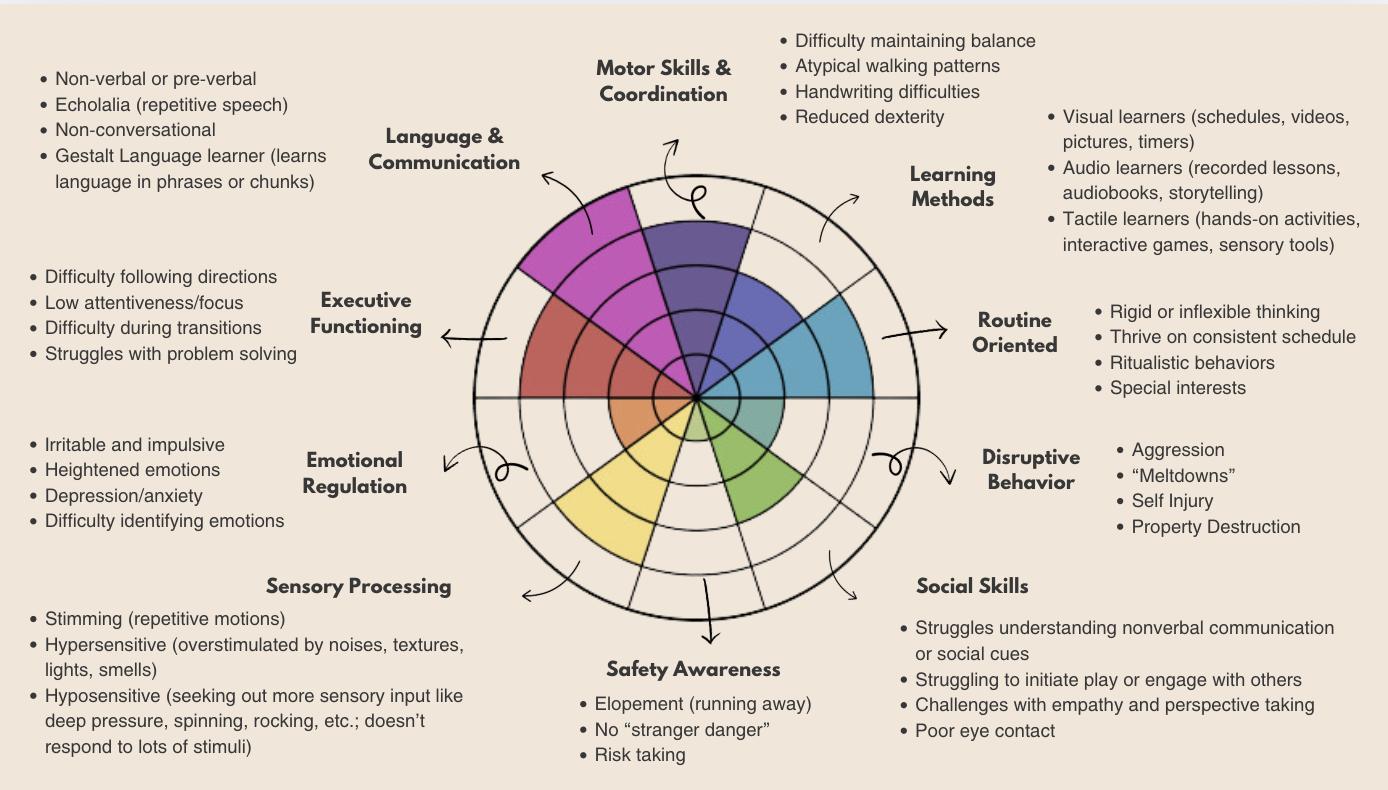
Effectively supporting autistic students requires collaboration with the school’s special education team. Depending on the level of needs, their team can include a wide variety of professionals. It’s essential for school counselors to understand who those team members are and who serves as a student’s primary case manager. These teams can include the special education coordinators and teachers, paraprofessionals, general education teachers, Board Certified Behavior Analysts (BCBAs), speech-language pathologists, occupational therapists and physical therapists. Other specialities may play a role, such as school psychologists, social workers, nurses, administrators, and of course, school counselors. Maintaining lines of communication is key, and clarifying roles and responsibilities can prevent overlap in the supports offered. Supporting the Student
School counselors can play a vital role in supporting autistic students by creating a welcoming and inclusive school culture. Visiting the students’ classrooms, especially if they’re in a sub-separate program, can help us better understand their daily routines and needs. It also gives us the opportunity to get to know them in an environment they are comfortable in. Counselors should also take the time to learn how each student communicates and respect their preferred mode of communication, whether that’s verbal, through AAC devices, sign language, or other methods. Making the counseling office sensory friendly and incorporating the student’s special interests into the space can help build trust and make the office more engaging. Inviting autistic students to visit the office proactively, rather than only during moments of crisis, can also increase comfort and familiarity. The school counselors can serve as safe and supportive adults for students looking to practice social skills and life skills, or looking to participate in structured individual counseling or small groups. These efforts not only help autistic students feel seen and supported, but can also build stronger school connections.
The special education team often have their defined roles in working with families, but school counselors can provide an additional layer of assistance. Counselors can help families by sharing community-based resources, facilitating connections with outside providers, and helping navigate systems of care. School counselors also play an important role in attending to the needs of the siblings, sometimes also known as “glass siblings.” What is a “glass sibling”? This label refers to siblings of children with significant disabilities who may feel invisible or overlooked, as much of the family’s attention and emotional energy goes toward the child with higher needs. These siblings may suppress their own feelings and struggles to avoid adding stress on the family. As school counselors, we can serve as a trusted adult in the siblings’ lives to offer emotional support and a safe space to be heard.
(see next page for resources)
(continued from previous page)
Supporting our autistic students and collaborating as a part of their team also means remaining knowledgeable about the services and programs available to families. Parents and caregivers are often left to navigate complex systems of care on their own, doing endless research, and advocating for their child, while also trying to keep their heads above water. Raising an autistic child is an emotional journey that requires families to become resilient, persistent and educated. The following resource guide was created by Lauren Shrestha, a Massachusetts mom from Swampscott with three autistic children. This wealth of information includes programs, community centers, educational resources, and other tools available across the state. Click here for the PDF version. School-wide Initiatives to Promote Inclusion
Promoting inclusion for autistic students requires a school-wide commitment to creating a culture of acceptance and celebration of neurodiversity. An opportunity to promote appreciation is in the month of April for Autism Awareness month. This would be a time to highlight autistic experiences, create daily themes or a spirit week, and promote kindness. Buddy programs where autistic students could be paired up with peers can help foster friendships and embrace understanding. Special Olympics and adaptive sports programs also offer these students the opportunity to engage in physical activities they enjoy while adjusting to their needs. Classroom lessons led by school counselors or teachers can also help educate the school about neurodiversity, communication differences, and ways to be respectful and supportive. The goal is to push past awareness and advocate for true inclusion to make all students feel accepted.
To learn more about best practices and strategies in supporting your students in special education, register for the IDEA Professional Development training on November 4, 2025. This training, Bridging Roles: School Counselors in Special Education Support, will include a session that dives further into autism in schools and discussion with a parent panel. Click here to register.

Thursday, September 11, 2025 from 3:30-4:40 pm. This webinar is FREE and hosted by the Retiree SIG. Understand the Social Security Fairness Act! Many people are losing significant income to which they areentitled because they mistakenly believe that they do not qualify for benefits or for an increase. Many retireesnever applied for spousal benefits and need to re-apply.
Marie Ardito, Retirees United Retirement Specialist, will teach us how to help ourselves and our loved ones. This historic act corrects the reduction of benefits for educators who qualify (40 quarters) and also adds eligibility for spousal benefits (including divorced spouses married at least 10 years) and survivor (widow) benefits. You must pre-register here
Contact Anne Thidemann French or Helen O’Donnell with questions.
Join Our MASCA Retirees SIG!
Anne Thidemann French annethidemannfrench@gmail.com and Helen O’Donnell helenod@att.net
All are welcome at our SIG meetings to plan for retirement, be informed about retirement issues, and share your retirement experiences. We welcome attendees to participate in discussions, ask technology and retirement questions, and suggest new topics and speakers. Whether you are retired or just dreaming of retirement we are here for you. Retiree SIG webpage https://masca.wildapricot.org/page-18134
Nov. 20 - Issues Facing Retirees - Speaker: Marie Ardito, Retirees United Retirement Specialist 3:30-4:40 via ZOOM. Register HERE
MASCA’s 2024 Special Award Recipient, Maria Ardito, will again present her webinar on Issues Facing Retirees, for colleagues anticipating retirement. She is very informed and considered an expert. Her very detailed ppt and contact information will be posted on the Retiree SIG webpage. She welcomes your inquiries during the webinar or email questions to helenod@att. net with Retiree SIG in subject line.
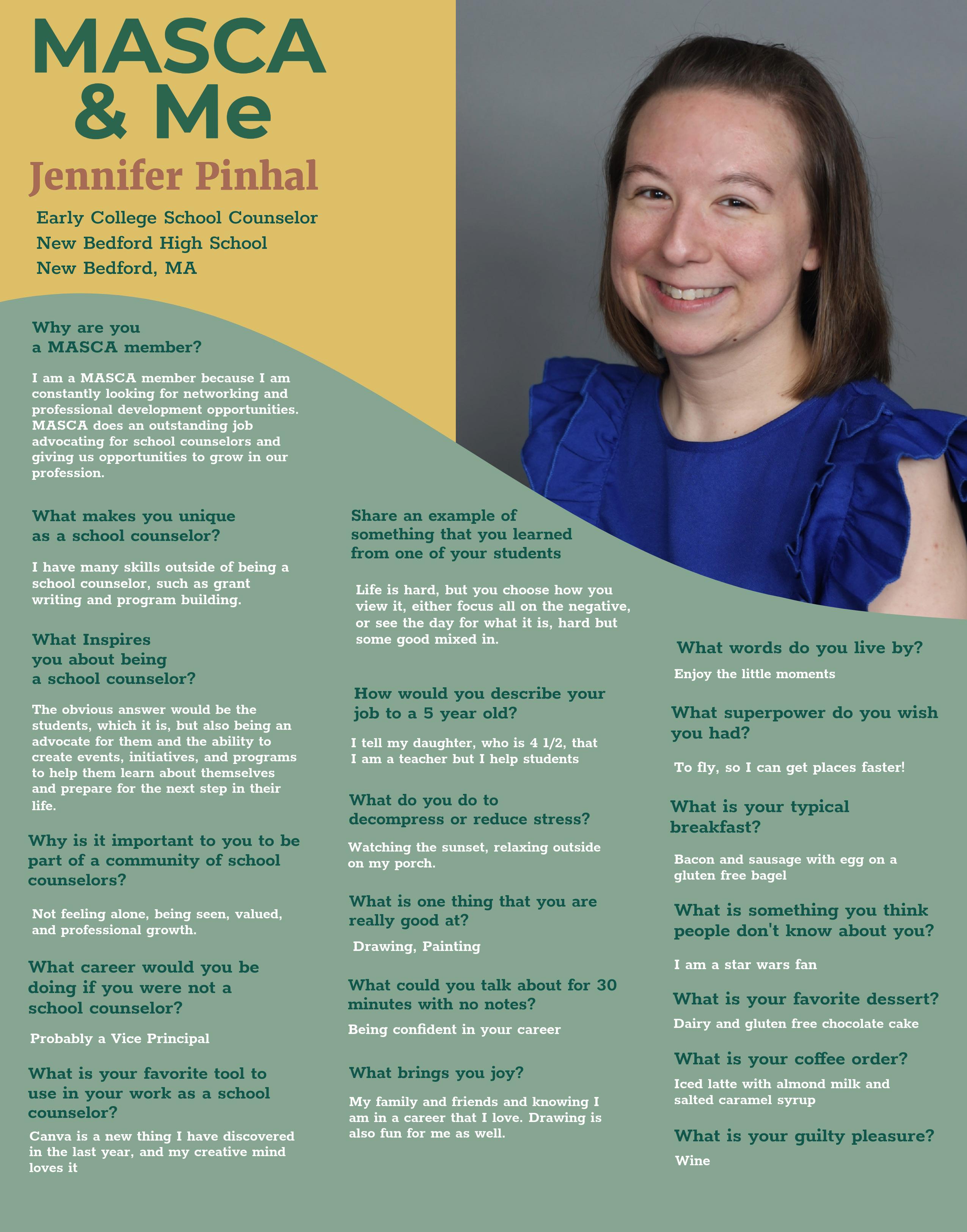
By Luz Mederos-Dorleans
¡Bienvenidos back, everyone! This past summer, I spent a lot of mommy-daughter time with my youngest, Luna, while juggling the endless pick-ups and drop-offs for my three oldest girls, Sophie, Isabella, and Mia. Life was busy, but full of love and laughter. Still, I found myself looking forward to the third annual School Counselor Summer Camp (SC2). For me, SC2 has become more than just professional development—it’s a chance to step away from the grind, connect with colleagues, and fill my cup. If you haven’t experienced it yet, I encourage you to make it a priority next summer.
The first workshop I attended was Beyond the Tears: Practical Strategies for Supporting Grieving Students, led by Mindy Cripps and Shanelle Fernandez (2025). This session provided us with the tools to support students who are navigating grief, reminding us that it doesn’t always manifest in ways we expect. One moment that stayed with me was the emphasis on culture—how each family’s way of grieving deserves respect and understanding. As a Latina, I know how deeply culture shapes our rituals, silences, and expressions of loss. A key takeaway for me was the concept of creating individualized coping plans with students. These can serve as powerful re-entry guides, helping students transition back into school while also providing teachers with clear and compassionate ways to offer support.
A favorite session of mine was Sharing Best Practices (Middle School). It truly felt like being among my people—fellow counselors who “get” the middle school experience. We came together as a community to share strategies, troubleshoot, and celebrate what works with this unique age group. The conversation naturally shifted toward our wellness because, let’s be honest, middle school can test your patience and energy. We swapped tips for setting boundaries, managing time, and making space for ourselves. But the best part? Walking away with new colleagues, I can now call on when I need fresh ideas or just someone who understands the middle school world. My toolbox grew, and so did my circle.
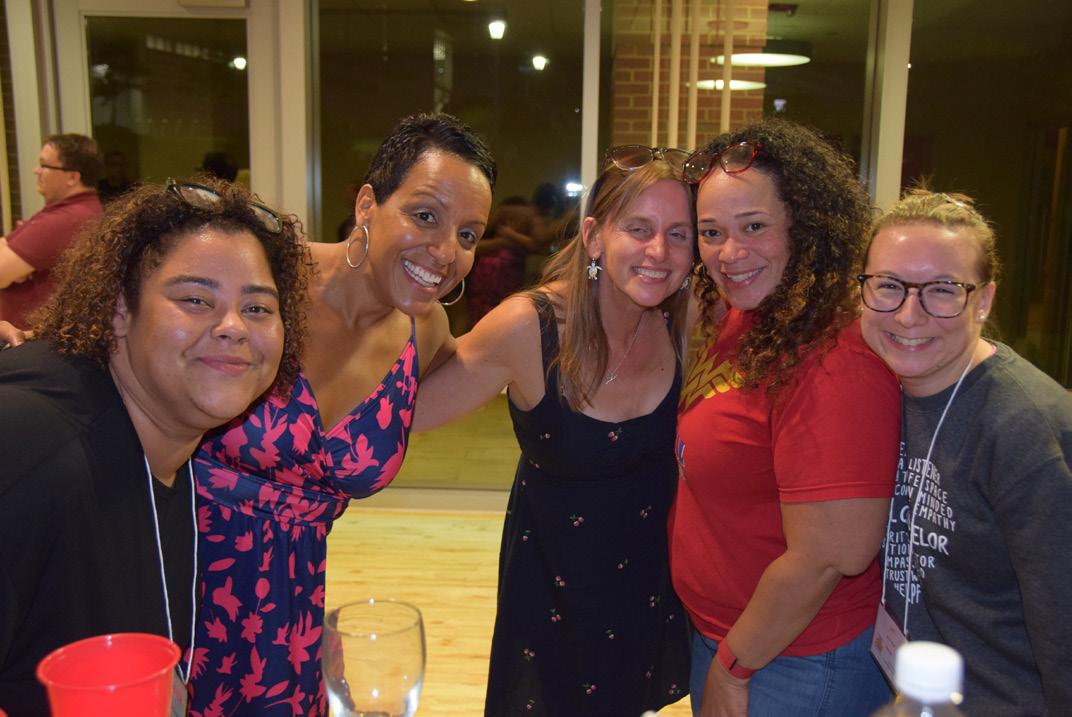
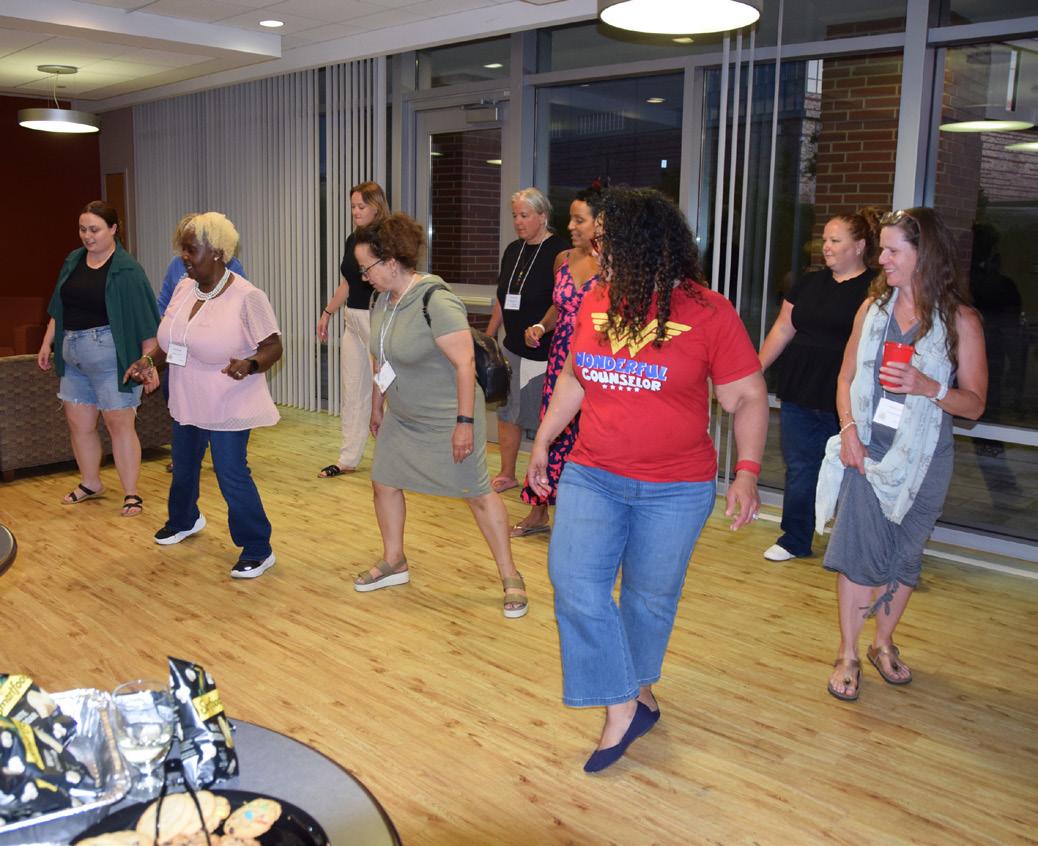
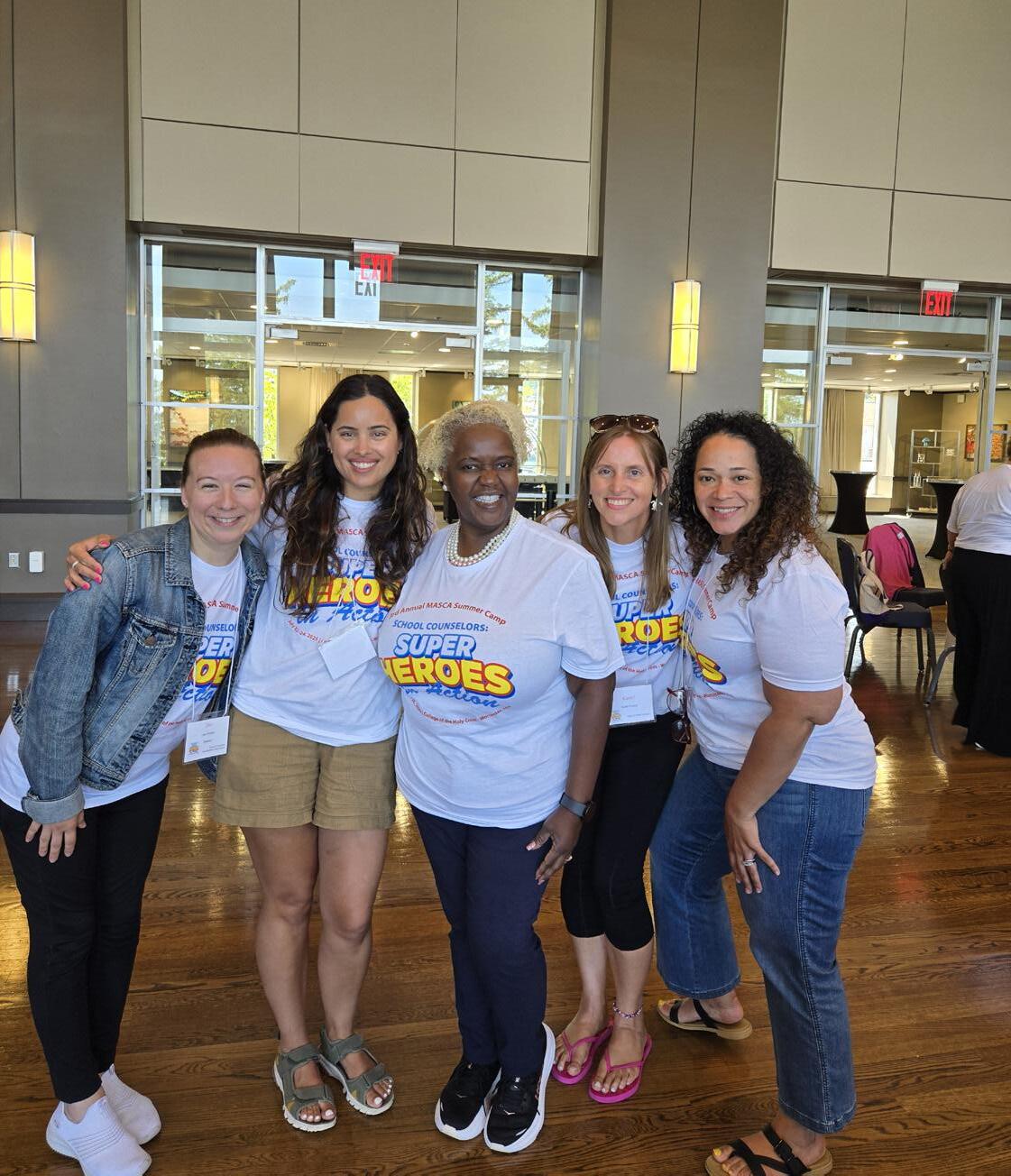
(continued next page)
(continued from previous page)
The Difficult Conversations workshop, led by Deb Hempel and Mindy Cripps, could not have come at a better time. We covered tough topics like delivering bad news, giving honest feedback, and navigating conflicts. What resonated most was the importance of entering these moments with empathy, curiosity, and openness, rather than fear or judgment. I signed up for this session with a purpose—because, let’s be real, by the end of the year, I’m always knee-deep in those hard conversations about promotion or summer school eligibility. Those talks are never easy, but now I feel more prepared. I’m walking into this school year with practical tools and, even more importantly, the confidence to handle those moments with clarity and compassion.
And then, the perfect way to close: Recharge and Reconnect: Self-Care & Wellness, led by Tama Lang and Diana Fullerton (2025). This was the reminder I didn’t know I needed: we cannot pour from an empty cup. We stretched, breathed, laughed, and even folded paper cranes while reflecting on the story of Sadako and the Thousand Paper Cranes—a powerful symbol of hope and resilience. I walked out with a commitment to stop treating self-care like an afterthought and to start making it a regular part of my life.
Of course, SC2 wasn’t just about the workshops. Each morning, I carved out time for a quick run and joined morning yoga with Tama Lang to start the day strong. Evenings were for connection—sharing food, laughter, and stories with counselors from across the state. Those moments of comunidad were just as powerful as the learning, because they reminded me I’m not in this work alone.
SC2 brought together everything I needed— learning, recharging, and building community. We accomplished a great deal of work, but we also had a lot of fun along the way. For me, that balance is what makes this experience so special. The fun and excitement at SC2 are contagious, and I encourage you to apply next year and see it for yourself. You’ll leave with new ideas, new friends, and a renewed sense of purpose for the year ahead.

By Cory McGann
Welcome back to all School Counselors starting a new school year, especially those starting at a new building, a new role, or with new colleagues and new challenges. It’s a wonderful time of year: exciting, rewarding, etc. But before we get to that, I’d like to spend just one paragraph mourning the loss of summer:
The grieving process is difficult and challenging, but an important step as we understand and process our loss and search for a way to move forward. We loved our time together: from sunset walks on the beach, to traveling on adventures with friends, or maybe even choosing to do some fun professional development with MASCA Summer Camp (shout out to a record setting crew of attendees!), we all had a special, close relationship with our summer, and now it has ended. It is normal (and healthy!) to grieve the loss in our own way so that we are able to move forward in our new summer-less reality.
OK, I feel better. It’s an important step to be able to say goodbye to those summers that we have lost.
However, in all seriousness I do think that we are blessed as School Counselors in Massachusetts for two reasons. First, the fall is awesome in New England! Yes, we no longer get beach days, but we get great autumn weather, the ability to wear sweatshirts and comfy clothes a lot, football, road trips, apple picking - the list goes on. We are in a great spot in the world to be able to say goodbye to summer but hello to a fantastic fall season.
But the second reason is that we are School Counselors! We get to greet excited students ready to do good work this year and achieve their goals. We get to form relationships with them early in the year and feed off of their excitement at the possibilities ahead. It will get harder as the year gets on, for sure. The weather gets colder, the days get shorter, and the student enthusiasm wanes. But not in the fall. In the fall it is sharpened pencils and sunshine.
Each and every one of us in our counseling roles can utilize the fall to get our academic years off to a great start. And it’s not just goal setting (although that is important). It’s about how you want to look back on this year in June and overall feel that it went really well. That all starts now, in the fall.
You are recharged, refocused, reenergized, andabove all - super enthusiastic. You are going to make a difference this year to all of your students, and to a select few (and you may not even know who they are yet) a life changing difference. What a way to be able to start a school year! And all because you are a School Counselor in Massachusetts. We have the best jobs in the world!

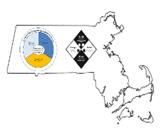
the
Helen C. O’Donnell, Ed.D helenod@att.net
MASCA MA Model Committee, 3.0 Writing Team Co-Chair, MA Model Trainer
Endorsed by both MA DESE and MA School Counselors Association's Governing Board, the MA Model 3.0: A Framework for Comprehensive School Counseling Programs is an evolving document to guide professional best practice. It was presented as a professional courtesy to the field in the spring of 2020 as a public domain resource. This ongoing Counselor’s Notebook (CN) series shares steps and strategies for implementing the MA Mode 3.0 and ASCA Model 5.0©. A library of resources and chart of past CN implementation articles are available at https://masca.wildapricot.org/MA-Model_3.0
Currently in its 3rd revision and endorsed by MA DESE and the MASCA Governing Board, the MA Model 3.0: A Framework for Comprehensive School Counseling Programs is posted on both DESE and MASCA’s websites. The MA Model has been the theme of conferences, 10 recorded MASCA webinars, and 4 graduate courses offered through continuing education at Fitchburg State University. MASCA has also offered 20 years of workshops, institutes, and both individual and cohort PD training opportunities. This fall, MASCA is launching school-based staff training opportunities with many themes connected to MA Model implementation.
The MA Model aligns itself to several MA DESE initiatives including the current CCR/MyCAP training. The MA Career Development Education (CDE) Benchmarks are embedded in the MA Model. MA DESE resources are included in the MA Model’s appendix and are cited throughout the document.
There have been 50+ MA Model Implementation articles published in the Counselor Notebook to educate you and support program development. Thank you, Bob Bardwell, for posting a chart of downloadable CN articles by category (Define, Assess, Manage, Deliver) on the MA Model webpage for your easy access. https://masca. wildapricot.org/CN-Implementation-Articles
Since 2007, over 152 MA Accountability Report Cards (MARC and MARC Jr. documents) have been recognized by David Elsner and the MARC Committee.
The MASCA CORE Values include:
Collaboration – Working together with all stakeholders allows school counselors to deliver the highest quality school counseling program for all students.
Excellence – Maintaining the highest level of professional standards and advancing the delivery of comprehensive school counseling programs (i.e.: MA Model) for all students.
MASCA Strategic Objective #4 Professional Development states:
Create, provide, and/or promote relevant, high-quality, accessible, and timely professional development to meet the needs of our members and support the implementation of comprehensive school counseling programs.
MASCA has standing committees that imbed the MA Model including the MA Model and MARC Committee, the Recognition Committee, and the Peer-Review teams completing program reviews. (Price structure available.)
In this CN issue, the MASCA Recognition Committee is announcing the 2026 Exemplary School Counseling Program (ESCPA) Award details and the submis-
sion process. The Award recognizes exemplary comprehensive school counseling programs that meet the award criteria. In late September, I will host the webinar, Presenting Exemplary MA Comprehensive School Counseling Programs. The Recognition Committee will explain the 2026 award criteria and the 2025 and 2024 recognized programs have been invited to discuss their programs. Look for a MASCA announcement inviting members to sign up for this free webinar.
Assessing Your Implementation Progress and Identifying Next Steps
School Counseling Programs are fluid: new counselors replace retirees; new administrators lead schools and departments; updated department goals guide program development; and new resources and programs are planned to address data-identified student gaps and current student needs. As you begin your school year, here are some program assessment ideas:
Electronically share the MA Model 3.0: A Framework for Comprehensive School Counseling Programs document with administration and colleagues. Offer to discuss contents to keep everyone informed about your goals to achieve a comprehensive school counseling program for all students.
Take time to refresh department messaging to confirm they reflect current department mission, goals, programming, and practices.
(continued next page)
(continued from previous page)
Reflect on the role of the school counselor as a Leader, Advocate, Communicator, and Systemic Change Agent.
Guided by the Self-Study Audit (last document in MA Model 3.0 appendix), individually or as a department complete the audit and compile the results. OR together, discuss each domain section of MA Model 3.0 document and brainstorm the implementation level of each component. Based on the audit results and team discussions, create an action plan, identify PD topics, set end year department SMART goals, and plan strategic data collection to measure action plan progress.
Use available resources including the MA Model 3.0 document, review past CN MA Model Implementation articles, and download ASCA Model 5.0 www.schoolcounselor.org
Consider Professional Development. Fall semester open registration for individual or small cohort graduate coursework ends Sept. 15th, 2025. Cost: $450 for 45 PDP’s; Graduate Credit from Fitchburg State University and additional $295. Inquiries: helenod@att.net
Counselors in K-12 Classrooms: Delivering Curriculum That Supports Academic Achievement & CCR (includes lesson planning, curriculum mapping, annual calendar development, and delivering standards-based instruction)
Counselors in K-12 Classrooms: Action Research and Program Assessment
(includes developing/reviewing curriculum maps, on-going data collection and using instructional and department data to informed action planning.)

THE BEHAVIOR
PRACTICAL TRAUMA-INFORMED STRATEGIES FOR REDUCING ANXIETY AND CHALLENGING BEHAVIOR
Friday, October 24, 2025
8:45 a.m. – 3:30 p.m.
Kurn Hattin Home and School for Children 708 Kurn Hattin Rd, Westminster, VT 05158
Join colleagues from across the region for a full-day professional conference focused on practical strategies to support students with anxiety and challenging behavior.

Featured Speaker: Jessica Minahan, Ph.D., BCBA, LABA Licensed and boardcertified behavior analyst, author, special educator, and international consultant. CE credits available for many professionals. Scan the QR code or go online by 10/10/25 to register for a discounted rate: kurnhattin.org/fall-conference

The Top 10 Benefits of MASCA Membership
• Networking Opportunities
• Professional Development Opportunities / PDP’s
• Annual Professional Conference
• Members-only Special Interest Groups (SIGs)
• Members-Only Content on Website
• Counselor’s Directory online through Website
• Access to MASCA’s mentoring program
• The Counselor’s Notebook
• MA Model - a Comprehensive School Counseling Program
• Advocacy and Legislative Action Go to https://masca.wildapricot.org/join-us
By Megan McShane, Elementary SIG Co-leader
We all know that first-day-ofschool energy, which is both positive excitement and slightly nervous anticipation. I always feel like it is a bright day, both the sunshine of the final days of summer, the smiles of well-rested students, and all of those new shoes and clothes that the many messes of childhood haven’t yet marked. Then I hear it faintly in the distance of the parking lot, my School Counselor Bat Signal, a scream of, “NO, I’M NOT GOING!” and I know it is my time to shine. I take a deep breath to make sure I remain calm as both the nervous student and their equally upset parent approach me at the door. I will share with you lessons I have learned over the years about how to best intervene in this moment.
We know the drop off of a nervous student well as they cling to their trusted adult with a grip stronger than the Incredible Hulk. I think escalated students relate well to the Incredible Hulk; they feel strong emotions, their fight or flight response is turned on red alert, and their thinking brain is turned completely off. So when their trusted adult says, “Look, it is Ms. McShane, you love Ms. McShane!” that nervous young mind doesn’t even know their name in that moment. I have learned over the years that these students are strong and run faster than The Flash, so I like to be a calm presence for a brief moment while they cling to their safe adult with their Hulk hands. I do my “Ms. McShane kneel” and crouch down to their level, and the older I get, my knees make a great sound that for some of my younger students, gives them just the little chuckle they need to remember the silly lady who comes by when they are feeling sad, soften-
ing that grip just a bit. I love that backpack designs are so full of personality because there’s nothing like seeing a Spiderman bag and asking if the student wants to make Spiderman webs into the building with me. Then I give my best demonstration of how I make my Spiderman webs, and a true Spiderman fan corrects me and needs to demonstrate, “No, you make them like this.” I’ve gotten many a student to enter the building by swinging on our webs through the hallway.
When my backpack connections fail, there is the moment you make eye contact with the trusted adult and know you need to assist in getting the student off their adult. In my experience, many students do release from their adult fairly quickly when the adult says it is time and gives me permission to hold a hand or give a bear hug while they leave. Early in my career, however, with an older elementary student who was returning with his class from a field trip that his mom chaperoned, I learned that it is equally important to make sure the parent is truly ready for the exchange. This particular mom said to the student he needed to go with Ms. McShane, and I held his hand and began walking in the opposite direction towards his class. Suddenly, I was being pulled back not by the student, but by his mom pulling him away from me for one last goodbye! This led to a slip on the rug, sending me to the floor on my bottom, and in my embarrassment, I told her to carry him to my office. After some time playing UNO and giggling over me on the floor, he did successfully transition back to class. Now I ask
multiple times and truly read the eyes of the trusted adult to make sure they are ready and going to help me separate their child from them.
Unfortunately, sometimes when we make it to the room, the student then realizes their trusted adult has left, and our second escalation begins with a dart towards the door. I have mastered my kneeling posture at the classroom door over the years after a kindergartener took me down to the ground one time in what his teacher described as a masterful pro wrestling move. I just remember suddenly being flat on my back while he ran down the stairs. That student’s mother still apologizes to me about that; her son is now in middle school, and it gives us all a great chuckle. Another favorite strategy is the co-regulation shoulder rub with the words, “you’re safe,” over and over again. Then I ask the question that I already know the answer to, but it gives them some choice and empowerment: “Do you want me to hang out in your classroom with you, or do you want me to leave?” To be honest, I love hanging out in classrooms the first few days because teachers always put out the fun center manipulatives.
The best moment is when that student who you helped enter the building on the first days or weeks of school sees you in November and gives you a big smile saying, “Hey Ms. McShane, I walk in so good now!” I love supporting these first-day-of-school jitters because it is such a scary moment for a child, and if I can give them a smile, giggle, or a feeling of safety in a scary moment, then I am doing my job as a School Counselor. It should be noted that I was that child with the tears and Incredible Hulk hands, so when I call that trusted adult around lunch time with a positive update, I say, “I was that child, and look at me now, so I can confidently say they will be okay.”

GOVERNING
Chair: Ali Robidoux
School Adjustment Counselor
Apponequet Regional High School
Assistant Chair: Cory McGann
School Counseling Department
Head
Ashland High School Board Members
Mindy Cripps
Director of School Counseling
Billerica High School
John Crocker
Director of School Mental Health & Behavioral Services
Methuen Public Schools
Jessica Descartes
School Counselor
Tech Boston Academy
Andrea Encarnacao
School Counselor
Boston Latin School
Cynthia Esielionis
School Counselor
Ayer Shirley Regional Middle School
Lori Ford
School Counselor
Edgartown School, Martha’s
Vineyard
Amanda Ugrinow
School Counselor
Westborough High School COMMITTEES
Conference
Ali Robidoux
School Adjustment Counselor
Apponequet Regional High School
Ethics
Mindy Cripps
Guidance Director
Billerican High School
Fiscal Oversight
John Crocker
Director of School Mental Health & Behavioral Services
Methuen Public Schools
Government Relations & Advocacy
Juliette Coatsworth
School Counselor
Foxborough Regional Charter School
Fran Frederick
School Adjustment Counselor
Belchertown High School
Inclusion, Diversity, Equity & Access
Vacant
MA Model
Jodi Then
School Counselor
Snowden International School, Boston
Cynthia Esielionis
School Counselor
Ayer Shirley Regional Middle School
Member Services
Tama Lang
School Counselor
Litwin Elementary School, Chicopee
Nomination and Bylaws
Jessica Descartes
School Counselor
Tech Boston Academy
Professional Recognition
Dina Sibilia
School Counselor
West Springfield High School
Tama Lang
School Counselor
Litwin Elementary School, Chicopee
Publicity
Luz Mederos Dorleans
School Counselor
Boston Latin Academy
Chris Soverow
Retired School Counselor
Research and Evaluation
Tim Poynton
Professor
UMASS Boston
School Counselor Pipeline
Jessica Almeida
School Counselor
Quinn Middle School, Hudson
Jennifer McGuire
College & Career Information
Coordinator
New Bedford Public Schools
Strategic Planning Vacant
Technology
Jennifer McGuire
College & Career Information
Coordinator
New Bedford Public Schools
APPOINTED POSITIONS
Executive Director & Member-
ship Coordinator
Bob Bardwell
Secretary
Julia Cahill-O’Shea
Counselors Notebook & Tech
Coordinator
Jean Atwater-Williams
Mentoring Coordinator
Maryanne Margiotta
Program Review Coordinator
Kari Denitzio
Diversity Fellows
Amanda Berg
ESP, Hadley Elementary School
Roz Riggins-DesRuisseux
School Counselor
Snowden International School, Boston
Denise Evans
School Counselor
The Carroll School
JC Topete Martinez
School Counselor
Boston Latin School
PDP Coordinator
Ali Robidoux
School Adjustment Counselor
Apponequet Regional High School
LIAISONS
Affiliate Liaison
Christine Weissman
Family & Community Engagement
Counselor
Ware Jr.-Sr. High School
Counselor Educator Liaison
Megan Krell
Associate Professor
Fitchburg State University
DESE Liaison
Lisa Harney
MA Dept of Elem & Sec Education
Emerging Leader Liaisons
Cory McGann
School Counseling Department
Head
Ashland High School
Courtney Royal
School Counselor
Gloucester High School
Graduate Student Liaisons
Ryan Beck
Gradudate Student
UMASS Amherst
Rachel Flagg
Gradudate Student
Assumption University
Nicole Ward
Gradudate Student
Boston University
EMERGING LEADERS
Allison Brann
School Counselor
Athol-Royalston Community School
Charlsey Penney
School Counselor
Challenge & Reach Academy, Worcester
Jen Pinhal
Early College School Counselor
New Bedford High School
Sara Runkle
School Counselor
Kiley Prep Middle School, Springfield
Emerging Leader
Anthony Simmons
School Counselor
Atlantis Charter School
SPECIAL INTEREST GROUP (SIG) LEADERS
Career/Technical
Annie McCarthy
School Counselor
Franklin County Technical School
Maryrose O’Neil
School Counselor
Tantasqua Regional High School
Kaitlin Monahan
School Counselor
Greater Lowell Technical High School
Counseling Directors
Meg Clougherty
School Counseling Program
Director
Boston Latin School
Brynn Cooper
Director of Counseling
Weymouth High School
Elementary
Lori Ford
School Counselor
Martha’s Vineyard
Megan McShane
School Counselor
St Columbkille Partnership School
Maura Ricardi
School Adjustment Counselor
East Street School, Ludlow
Multilingual Learners
Priscila Anderson
School Counselor
Woburn Memorial High School
Matt Baione
School Counselor
Revere High School
Olivia Hull
School Adjustment Counselor
Brookline High School
Middle Level
Dawn Martin
School Counselor
Qualters Middle School, Mansfield
Jackie Saunders
School Counselor
Gibbs School, Arlington
Amy Wilder
School Counselor
West Bridgewater Middle / Senior Hight School
Retirees
Helen O’Donnell
Retired School Counselor
Anne Thidemann French
Retired School Adjustment Counselor
School Adjustment Counselors/
School Social Worker
Nychele Clark
School Adjustment Counselor
Gardner High School
Kate Niedel
Retired School Adjustment Counselor
Anne Thidemann French
Retired School Adjustment Counselor
Secondary
Karen McCrillis
School Counselor
Gardner High School
Anthony Simmons
School Counselor
Atlantis Charter School, Fall River
Rachael Weinhold
School Counselor
Winchendon High School
Urban
Rani Gould
School Counselor
The Academy at Kiley Middle School
Chase Grogan
Student Development Counselor
Community Academy of Science and Health
Sara Runkle
School Counselor
Kiley Prep Middle School, Springfield
AFFINITY GROUP LEADERS Counselors of Color
Jessica Descartes
School Counselor
Tech Boston Academy
Andrea Encarnacao
School Counselor
Boston Latin School
Aaron Spencer
School Counselor
Nashoba Valley Technical High School
LGBTQ+
Jessica Almeida
School Counselor
Quinn Middle School, Hudson
Mindy Cripps
Director of School Counseling
Billerica High School
Denise Evans
School Counselor
The Carroll School
Bristol County Agricultural High
School
Mission Statement:
The mission of MASCA is to elevate and advance the school counseling profession in Massachusetts through leadership, collaboration, visibility, and professional development to optimize student success.
Vision Statement:
The vision of MASCA is to equip school counseling professionals with the knowledge and skills needed to implement a comprehensive school counseling program in their school community. Through an equitable lens, we advocate that all K-12 Massachusetts students have access to a school counselor and the opportunity to become their best selves in school, their personal lives, and their communities.
Core values:
Advocacy - Committing to center the school counseling profession by highlighting and advancing the core values of school counselors, both individually and as a profession.
Equity - Requiring inclusivity, diversity, and accessibility for all school counselors and the students and families they serve
Collaboration – Working together with all stakeholders allows school counselors to deliver the highest quality school counseling program for all students.
Excellence - Maintaining the highest level of professional standards and advancing the delivery of comprehensive school counseling programs (i.e.: MA Model) for all students.
Strategic Objectives:
Objective #1 - Advocacy - Position MASCA as a recognized, valuable, and respected voice at local, state, and regional levels by building the awareness of the importance and impact of the work and role of school counseling professionals.
Objective #2 - Equity - Position MASCA as a leading organization in dismantling racist, sexist, homophobic, gendered, ableist, ageist, religious intolerance and other oppressive policies and practices while emphasizing the need for diversity and inclusion in school counseling personnel and programming.
Objective #3 - Membership - Grow MASCA membership by retaining and engaging current members, and recruiting new members, with an on-going commitment to cultivate a more diverse membership.
Objective #4 – Professional Development - Create, provide and/or promote relevant, high-quality, accessible, and timely professional development to meet the needs of our members and support the implementation of comprehensive school counseling programs.
Objective #5 – School Counselor Pipeline - MASCA must address the increasing number of unfilled school counselor vacancies and reduction of candidates entering school counseling preparation programs.

Counselor’s
Jean Atwater-Williams